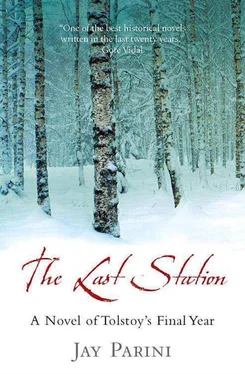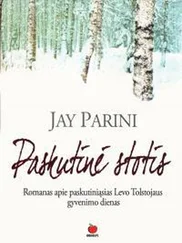‘The count has gone for a walk,’ the man informed me. ‘He would like you to wait for him in his study.’
I was led into Tolstoy’s private chambers through a light-drenched, empty house – a fairly typical country house of an aristocratic Russian family, though more sparsely furnished than one might expect. The wooden floors, the color of honey, glowed.
‘You would like some tea?’
I declined, thanking him, and was directed toward the cracked leather couch against the far wall. I sat down and crossed my legs, feeling out of place here – like one who wanders into church on a weekday. When the man was gone, I stood up again, jittery but curious. The room was smaller than I had imagined it would be, with pale, dirty walls. It smelled faintly of hemp and tallow, an old man’s smell. An ornately scrolled, thick-legged writing table stood in the center of the room, an altar of sorts. I touched it gingerly, running my hand along the smooth desktop, then sat in Tolstoy’s chair. I felt as if I had mounted a powerful horse that was about to charge off all by itself, oblivious to my wishes.
Stacks of letters, all with envelopes torn open but probably unanswered, lay in clumps on the desk. A stone jar full of pencils and fountain pens stood to one side of the blotter; a pot of India ink was loosely covered beside a ledger. There was a notebook lying open. The handwriting was large but difficult, that much I could tell from a distance. I would have loved to peek into the notebook, but I didn’t dare, backing away from the desk.
A double row of books hung in a rack on the wall. The bottom level contained a miscellany of texts: philosophers, religious thinkers, biblical studies, novels from England, France, and Germany. A few Russian novelists and poets. I plucked an odd-looking volume with a buff cover from the shelf and leafed through it. It was a play called Man and Superman by George Bernard Shaw, of whom I had not heard. A copy of a letter slipped from the pages onto the floor, and I picked it up. It was from Tolstoy to the author of the play, written in English. My eye fell on a passage near the end of the lengthy screed:
Indeed, my dear Shaw, life is a great and serious business, and each of us must contrive, in the brief time we have been allotted, to discover what our job is and do that job as earnestly as we can. This applies to all men and women, but especially to one such as yourself, a man with the gift of original thought who can pierce to the heart of serious questions. Thus, trusting that I will not offend you, I will say what seems to me to be wrong with your book.
The first defect is that you are not serious enough. One should never joke about the purpose of human life, the reasons for its perversion, or the evil that consumes humanity from day to day…
I broke off, hearing footsteps, hastily tucked the letter back into the volume, and returned it to the shelf. I was quivering now. This was a great man indeed. One who could write so plainly to a man like this Mr Shaw from England. It’s easy to praise people. To point out faults is another matter.
The footsteps passed, and their sound dwindled at the end of the hall. Now I looked up to the top row of books – the lovely Brochhaus Efron Encyclopedia, with its blue spines and gold lettering, stretched halfway across the room. Next to it was a row of Tolstoy’s novels, bound in buckram. I lifted a volume off the shelf: Boyhood – his first published book. I turned the pages, reading a few sentences, then plucked Anna Karenina from the set. I took a quick look at The Four Gospels Harmonized and Translated . In this massive work, Tolstoy manages to discern the true Gospel of Jesus – the story of a man who gave up the world for God, for man; in doing so, Jesus became God-like – His exemplary life, cleared of generations of mystical debris, is uncovered–’harmonized and restored’ – in this book, though few readers have found Tolstoy’s commentary easy to follow. It will take decades to clarify and elaborate on the work Tolstoy began.
I loved thinking that these volumes were Tolstoy’s very own. I clasped my hands behind my back, determined to touch nothing else. Various portraits on the wall caught my eye. There was Dickens in the flush of youth, his quick eyes blazing, and the poets Fet and Pushkin. I sat down again on the leather sofa, focusing my eyes on the ornate little table beside it, an antique, with a bell on it (for summoning me, perhaps?), and a vase of blue glass, filled with ornamental straw.
The door opened before I had even heard footsteps. It was Tolstoy, who stepped into the room like a sweet, old grandfather, apple cheeked and beaming, his fur-lined Siberian boots trailing clumps of snow. He wore loose, baggy trousers and a blue linen blouse, tied at the waist. He rubbed his red hands together.
‘I’m so glad you’re here!’ he said. ‘I’m so glad!’
His greeting was almost fulsome, but I did not question his sincerity. There was no room for that.
I handed him the letter from Chertkov, but he put the envelope on the desk without a glance. ‘Vladimir Grigorevich has already written about you at great length. I need your help quite badly. My new collection is hard work – it requires so much effort, and I am such an old man. Too old. But let’s talk about you. How is your own work progressing?’
I thanked him for his interest, but he dismissed my gratitude, saying that my writing had caught his attention, as it had Chertkov’s. I was grateful.
We talked about the work I might do on For Every Day , which Tolstoy had once thought of calling Circle of Reading , suggesting that one should keep reading and rereading the sayings it contained, continuously, as a circle is continuous. (Chertkov preferred the other title, so it was called For Every Day .) My work will be to compile an anthology of wise sayings for daily use in contemplation by the average Russian. An alternative to the Scriptures, or something to be read alongside them. I am to help in gathering and selecting quotations, and Tolstoy will read and approve (or disapprove) of what I do.
We sat together on the couch like children, our legs side by side, while Leo Nikolayevich (as he immediately told me to call him) spoke. Each day thirty or forty letters arrive from well-wishers, people in a state of spiritual crisis, angry readers, political revolutionaries, madmen. Leo Nikolayevich sifts through these himself, labeling the envelopes with a chalk marker: N.A. (no answer), A. (appeal for help), and S. (silly). Some of the silly letters and letters of appeal will be put in a tray each morning, and I will be asked to construct some response to them. Leo Nikolayevich reserves for himself those that most interest him. All letters will, after drafting, be taken to the Remington room for typing by his daughter Sasha. ‘You will like Sasha,’ he said. ‘She’s a lively girl, very attentive.’
The day will unfold from there, routinely. He explained that, unless he rings for me, he prefers to work undisturbed until two, when the entire household sits down to lunch in the dining room, with Leo Nikolayevich presiding over a discussion of some current topic. After eating, he likes to walk the grounds or, if he feels well enough, ride into the village or along a dirt trail in the forest on Delire. At five he returns to his study and takes a glass of tea, then works until the call comes for dinner, which is promptly at seven. I have an open invitation to remain whenever I choose. After dinner there is music or chess. He retires early most nights with the hope of reading, though now he reads less, or so he said.
‘You do not look well, Valentin Fedorovich,’ he said to me. ‘Do you feel all right?’
‘I slept rather badly last night. It may take a few days to adjust to a new bed.’
Читать дальше












